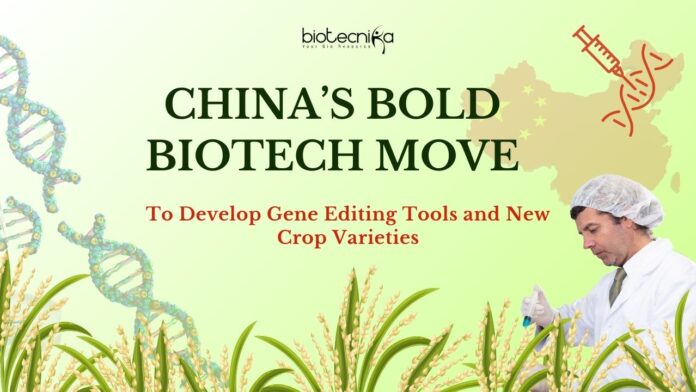China Set To Develop Gene Editing Tools & New Crop Varieties
Somewhere in the fields of the future, the seeds of advancements are sown by science and technology! A country that has long struggled with the challenge of feeding its massive population, China is now ready for some groundbreaking agricultural innovations.
With the development of supercharged crops and a new 5-year plan prioritizing gene editing, China is cultivating a future world where food security won’t be a major issue. This ambitious initiative could reshape the global food crisis; however, it will likely spark some ethical debates. The potential benefits of expanding sustainable food production while minimizing environmental impact. This initiative provides a hopeful vision for the future world.
A Vision for Food Security
China has launched an ambitious 5-year plan (2024-2028) to restructure its Agricultural sector through Biotechnology. This incredible initiative focuses on the development of high-yielding and novel crop varieties (such as corn, wheat, & soybeans) alongside gene-editing tools.
This plan signals an essential push towards self-reliance in food production, driven by a desire to reinforce agricultural technology and enhance food security. This launch also highlights the strategic significance of food independence in the face of global trade dynamics and geopolitical tensions.
The plan forms a comprehensive strategy to achieve ‘controllable and independent’ seed sources for essential crops, grow high-yield and multi-resistant crops, and reduce dependency on foreign seeds and technology. The primary goal is to apply and develop cutting-edge gene-editing tools that allow scientists to modify plant genetics more precisely. This precision breeding promises to accelerate the development of improved crop varieties.
Targeting Key Crops for Improved Resilience & Yield
The initiative targets the development of multi-resistant, high-yielding corn and wheat varieties to combat threats such as corn borers, Fusarium wilt, and soybean rust. These advancements aim to reduce the need for chemical treatments and prevent crop losses. High-yield, high-oil varieties of rapeseed and soybeans are also a major focus. These key crops are staples in the Chinese economy and diet, so enhancing their resilience and productivity is critical. Increasing rapeseed and soybean yields and oil content is vital to meet the growing demand for edible oils.
Soybeans: A Strategic Focus with Global Implications
China is the world’s largest importer of soybeans, mainly from Brazil and the United States, accounting for over 60% of global soybean trade. Therefore, the focus on boosting domestic soybean production is particularly noteworthy. By increasing soybean output, China aims to strengthen food security while reducing its vulnerability to global market fluctuations.
The emphasis on high-oil crop varieties reflects the growing global demand for vegetable oil. China’s soybean imports have surged in recent years, reaching over 100 million metric tons annually, highlighting the scale of its dependence. This initiative could reshape global soybean markets and gradually reduce demand for imports from major exporters like Brazil and the U.S. It would also alter agricultural dynamics and international trade relationships.
Boosting Livestock Productivity
Beyond crop development, this initiative also addresses the livestock sector. It focuses on improving livestock farming productivity and efficiency, such as breeding superior pigs with enhanced as well as improved feed conversion rates and reproductive capacity. Additionally, disease-resistant broiler chickens are a key target, aiming to improve livestock health and yield.
Innovation & Intellectual Property
This initiative emphasizes developing precision gene-editing tools with independent intellectual property (IP). The focus includes powerful technologies such as TALENs, base editing, and CRISPR-Cas systems for precise DNA modifications. This commitment to native innovation underscores China’s ambition to become a leader in agricultural biotechnology,
Navigating the GMO Debate
While proponents argue that biotechnology is crucial for addressing food security and sustainability, critics raise concerns about long-term biodiversity impacts and unintended consequences. Public perception of genetically modified organisms (GMOs) in China is complex, with some consumers remaining skeptical about the safety of GMO foods. Therefore, public engagement and clarity on the issue are vital for broad adoption.
Involving Farmers: Key to Adoption
The success of this initiative will depend partly on farmers’ adoption of these new crop varieties. Factors like seed costs, access to training and information, and government support programs will play a significant role. Many farmers are concerned about the availability of technical support and the financial burden of adopting these new technologies.
Investing in the Future of Agriculture
The 2024-2028 initiative represents significant agricultural R&D (Research and Development) investment, signaling a long-term commitment to using Biotechnology to modernize agriculture as well as enhance food security. The initiative has wide-ranging implications for China’s domestic food supply and global Agricultural markets.
The plan’s success depends on several factors, such as farmer adoption, the regulatory environment, as well as R&D’s effectivenes. China has a history of huge Agricultural research investment, and its Biotechnology capacity has grown rapidly. However, addressing public GMO concerns, as well as ensuring consumer confidence is important. China’s regulations on Gene-Edited crops are still evolving, and clarity on the approval process will be essential for attracting investment as well as fostering innovation.
This initiative highlights biotechnology’s growing importance in addressing global food security challenges. As the world’s population grows and climate change threatens agricultural production, innovative crop improvement approaches are essential. China’s focus on gene editing is not just a national initiative but a potential model for other countries facing similar challenges. By demonstrating the potential of biotechnology to enhance food security, China’s initiatives could inspire and motivate similar efforts around the world.
China’s biotechnology initiative represents a bold move to secure its food future through gene editing and the development of high-yielding and resilient crop varieties. This has the potential to transform China’s influence on global food security and agriculture. While challenges remain, the commitment and investment suggest China is serious about harnessing biotechnology to ensure its 21st-century food security, potentially impacting global trade and inspiring similar initiatives in other countries.
China Set To Develop Gene Editing Tools & New Crop Varieties – Latest News






























